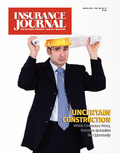At Wednesday’s Board of Governors meetings, a Citizens Property ũ�� Corp. committee voted to move ahead with the full, 15% average rate increase for personal lines in 2026 – the largest increase allowed under Citizens’ statutory glidepath.
But two members voted against the recommendation, bucking a trend in recent years that has strongly supported higher rates for Citizens to help drive consumers to primary market carriers. The discussion that followed focused on whether Citizens has reached a crossroads in how its rates are governed.

“We can no longer afford to increase insurance rates,” said board member Robert Spottswood, a Florida Keys real estate developer. “There are property owners that are passing on insurance because it’s too expensive. There are commercial properties that can’t afford it. There are affordable housing communities that are not sustainable because of insurance costs. So somehow, we’ve got to move insurance rates in the other direction.”
Board member Charlie Lydecker also voted against the planned rate increase. Earlier Wednesday, Lydecker questioned the wisdom of keeping up with a voluntary market that has recently seen large profits for a few carriers and hefty compensation packages for some executives.
“When I see … somebody take a salary at one of the carriers of $50 million, that says to me, for the first time, because we’ve been in crisis mode, that maybe we’re not thinking about this right,” said Lydecker, CEO of Foundation Risk Partners, an insurance brokerage and consulting firm.
Lydecker was apparently referring to recent revelations that Tampa-based Slide ũ�� Co., which went public on the Nasdaq stock exchange last week, had paid founder and CEO Bruce Lucas more than $21 million last year in salary, bonuses and stock awards. Slide paid Lucas’ wife, the chief operating officer, another $16.5 million.
By statute, Citizens is rather unique among state-created wind pools and insurers of last resort. It is required to aim for rates that are actuarially sound but also non-competitive – or higher than what the voluntary market offers. But that has proved impossible, given the statutory glidepath that caps annual rate increases. On top of that, Florida’s Office of ũ�� Regulation earlier this year shot down a maximum-allowed average rate increase and landed on less than 9%.
All of that has meant that in some parts of the state Citizens’ rates remain as much as 30% lower than what private carriers offer, officials said.

Lydecker argued it is perhaps time for a new model if the Florida market, just a few years past a full-blown crisis and multiple carrier insolvencies, can now afford to pay massive compensation amounts to executives.
“When someone can take $50 million out, there’s something else going on there,” Lydecker said. “Why are we, as a taxpayer-supported entity, playing that game?”
Either the state is not defining “actuarially sound” correctly, or “we’re playing a fool’s game of trying to be a true market of last resort,” he said. It may be time to have a conversation with state regulators about the Citizens’ model and statutory constraints, he added.
Citizens CEO Tim Cerio said at the meeting that Lydecker raised valid concerns.
“One of the things the commissioner and OIR have been focused on is the disparity and making sure that, what does that non-competitive piece mean? Is it higher than it should it because of all the other things going on in the market?” Cerio said.
Board member Jamie Shelton suggested meetings with lawmakers and regulators to discuss a new path forward for the insurer. Spottswood agreed.
Other highlights from Wednesday’s board and committee meetings include:
- Citizens has indeed continued to depopulate, thanks to a steady diet of takeouts and new players in the Florida market. Since the beginning of 2024, the state Office of ũ�� Regulation has approved some 2.2 million takeout offers, and more than 1 million letters have been sent to policyholders. Policyholders have accepted about 678,000 takeout offers.
- The carrier has dropped from a high of 1.2 million policies in force one year ago to just over 777,500 this month – a 36% decrease. Total exposure has dropped by $225 million. Citizens’ market share has dropped from 15% to 9% in less than 18 months.
- To continue to reduce its exposure and its presence in the marketplace, Citizens introduced a more robust clearinghouse platform, making it easier for insurance agents and policyholders to find other carriers. The new system was introduced in April and has been tweaked with improvements, including new information about wholesalers, said Carl Rockman, vice president of agency and market services for Citizens.
- Lydecker said the beefed-up clearinghouse will likely mean more work for agents. He urged Rockman to communicate fully with agents to consider additional training and education courses for agents.
- The Citizens website also offers a “find-a-carrier” button to help consumers shop around. And the corporation has developed a point-of-sale form that shows policyholders which carriers participate in the clearinghouse and which carriers an agent is appointed with. That kicks in September 1, Rockman said.
The full board meeting and the committee meetings can be seen on The Florida Channel.
Topics Florida
Was this article valuable?
Here are more articles you may enjoy.



 Erie ũ�� Facing 2 Class Actions Claiming Data Breach
Erie ũ�� Facing 2 Class Actions Claiming Data Breach  College Team Physicians Wary of Greater Liability Risk With Athletes Making Money
College Team Physicians Wary of Greater Liability Risk With Athletes Making Money  AT&T’s $177M Data Breach Settlement Wins US Court Approval
AT&T’s $177M Data Breach Settlement Wins US Court Approval  Weeks Later, Erie and Philadelphia ũ�� Still Working to Restore Networks
Weeks Later, Erie and Philadelphia ũ�� Still Working to Restore Networks 


